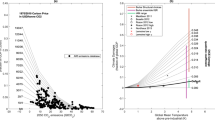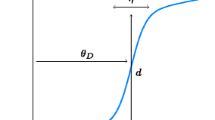Abstract
Despite the growing concern about actual on-going climate change, there is little consensus on the scale and timing of actions needed to stabilise the concentrations of greenhouse gases. Many countries are unwilling to implement mitigation strategies, at least in the short term, and no agreement on an ambitious global stabilisation target has yet been reached. It is thus likely that international climate policies will be characterized by a high degree of uncertainty over the stringency of the climate objective, and that some countries might delay their participation to global action. What additional economic costs will this delay in the adoption of mitigation measures imply? What would the optimal short-term strategy be given the uncertainty surrounding the climate policy to come? Is there a hedging strategy that decision makers can adopt to cope with delayed action and uncertain targets? This paper addresses these questions by quantifying the economic implications of delaying mitigation action, and by computing the optimal abatement strategy in the presence of uncertainty about a global stabilisation target (which will be agreed upon in future climate negotiations). Results point to short-term inaction as the key determinant for the economic costs of ambitious climate policies. They also indicate that there is an effective hedging strategy that could minimise the cost of climate policy uncertainty over the global stabilisation target: a short-term moderate climate policy would be a good strategy to reduce the costs of delayed action and to cope with uncertainty about the outcome of future climate negotiations. By contrast, failing to curb emissions in the short term imposes rapidly increasing additional costs of compliance.
Similar content being viewed by others
References
Aldy JE, Orszag PR, Stiglitz JE (2001) Climate change: an agenda for global collective action timing of climate change policies. Pew Center on Global Climate Change, Washington DC
Aldy JE, Stavins RN (2007) Architectures for agreement. Addressing global climate change in the post-Kyoto world. Vol. Cambridge University Press, New York
Bahn O, Haurie A, Malham R (2008) A stochastic control model for optimal timing of climate policies. Automatica 44:1545–1558
Bosetti V, Carraro C, Galeotti M, Massetti E, Tavoni M (2006) WITCH: a world induced technical change hybrid model. The energy journal, special issue on hybrid modeling of energy-environment policies: reconciling bottom-up and top-down: 13–38
Bosetti V, Carraro C, Massetti E, Tavoni M (2007) Optimal energy investment and R&D strategies to stabilise greenhouse gas atmospheric concentrations. FEEM Working Paper, Milan
Bosetti V, Carraro C, Tavoni M (2008) Delayed participation of developing countries to climate agreements: should action in the EU and US be postponed?. FEEM Working Paper, Milan
Bosetti V, Tavoni M (2009) Uncertain R&D, backstop technology and GHGs stabilization. Energy Economics 31:S18–S26
EC Communication (2007) Limiting global climate change to 2 degrees celsius: the way ahead for 2020 and beyond
Fisher A (2002) Irreversibility and catastrophic risk in climate change. In: van Ierland E, Weikard H, Wesseler J (eds) Risk and uncertainty in environmental and resource economics. Wagenigen University, Wagenigen
Frankel J (2007) Formulas for quantitative emission targets. In: Aldy JE, Stavins RN (eds) Architectures for agreement. Addressing global climate change in the post-Kyoto world. Cambridge University Press, New York
Ha-Duong M, Grubb MJ, Hourcade J-C (1997) Influence of socioeconomic inertia and uncertainty on optimal CO2 emission abatement. Nature 30:270–273
IEA (2002) Beyond Kyoto: energy dynamics and climate stabilisation. Vol. International Energy Agency, Paris
Ingham A, Ma J, Ulph A (2007) Climate change, mitigation and adaptation with uncertainty and learning. Energy Policy 35:5354–5369
IPCC (2007) Climate change 2007: synthesis report. Contribution of working groups I, II and III to the fourth assessment
Karp L, Zhang J (2006) Regulation with anticipated learning about environmental damages. J Environ Econ Manage 51:259–280
Kolstad C (1993) Looking vs. leaping: the timing of CO2 control in the face of uncertainty and learning. In: Kaya Y, Nakicenovic N, Nordhaus WD, Toth FL (eds) Costs, impacts and benefits of CO2 mitigation. IIASA, Vienna
Kolstad C (1996a) Fundamental irreversibilities in stock externalities. J Public Econ 60:221–233
Kolstad C (1996b) Learning and stock effects in environmental regulations: the case of greenhouse gas emissions. J Environ Econ Manage 31:1–18
Kosobud RDT, South D, Quinn K (1994) Tradable cumulative CO2 permits and global warming control. Energy J 15:213–232
Manne A, Richels R (1995) The greenhouse debate. Economic efficiency, burden sharing and hedging strategies, EPRI
Newell R, Hall D (2007) U.S. climate mitigation in the context of global stabilization. Resources for the Future, Washington DC
Nordhaus W, Popp D (1997) What is the value of scientific knowledge? An application to global warming using the PRICE model. Energy J 18:1–47
OECD. Burniaux JM, Chateau J, Duval R, Jamet S (2008) The economics of climate change mitigation: policies and options for the future. OECD working paper, December 2008
Olmstead SM (2007) The whole and the sum of its parts. In: Aldy JE, Stavins RN (eds) Architectures for agreement. Addressing global climate change in the post-Kyoto world. Cambridge University Press, New York
Olmstead SM, Stavins RN (2006) An international policy architecture for the post-Kyoto era. Am Econ Rev 96:35–38. Papers and Proceedings
Richels R, Edmonds J (1997) On stabilizing CO2 concentrations—cost-effective emission reduction strategies. Environ Model Assess 2:251–265
Schneider SH, Goulder LH (1997) Achieving low-cost emissions targets. Nature 389:13–14
Stern N (2007) The economics of climate change: the stern review. Vol. Cambridge University Press, Cambridge
Stern N (2008) Key elements of a global deal on climate change. The London School of Economics and Political Science, London
Ulph A, Ulph D (1997) Global warming, irreversibility and learning. Econ J 107:636–650
Wigley TML, Richels R, Edmonds J (1996) Economic and environmental choices in the stabilization of atmospheric CO2 concentrations. Nature 379:240–243
Yohe G, Andronova N, Schlesinger M (2004) To hedge or not against an uncertain climate future. Science 306:416–417
Author information
Authors and Affiliations
Corresponding author
Additional information
This paper is part of the research work being carried out by the Climate Change Modelling and Policy Research Programme of the Fondazione Eni Enrico Mattei and by the Climate Impacts and Policy Division of the EuroMediterranean Center on Climate Change. Financial support from the Italian Ministry of the Environment is acknowledged. The financial support of the EC 6FP TranSust.Scan project—Scanning Policy Scenarios for the Transition to Sustainable Economic Structures—is gratefully acknowledged. The authors are grateful for useful comments from participants to the Conference on the “Economics of Climate Change and Sustainable Development”, Chia, Italy, September 2007. The usual disclaimer applies.
Rights and permissions
About this article
Cite this article
Bosetti, V., Carraro, C., Sgobbi, A. et al. Delayed action and uncertain stabilisation targets. How much will the delay cost?. Climatic Change 96, 299–312 (2009). https://doi.org/10.1007/s10584-009-9630-2
Received:
Accepted:
Published:
Issue Date:
DOI: https://doi.org/10.1007/s10584-009-9630-2




